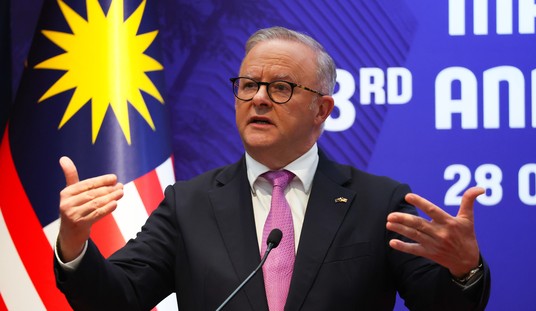John McCain’s campaign continued its daily press conference calls today with a discussion of Barack Obama’s Iraq policy. The McCain organization has made these a staple of their summer strategy, inviting both mainstream media and bloggers to participate. The candidate himself has not made many appearances for these calls, but they usually arrange high-profile surrogates. Today, Senator Lindsey Graham talked about Obama’s op-ed in the New York Times.
Graham said he was “astonished” by the piece, a “brazen effort to rewrite history.” Whether anyone agrees on our entry into Iraq, it became a central front in the war on terror as soon as al-Qaeda began recruiting terrorists to go there and attack our troops there. Osama bin Laden himself made that clear in speeches and writings, and it has allowed us to have our military bring its full might against AQ and radical Islamist terrorists. Had we lost in Iraq, it would have been a huge victory for AQ.
Insisting that Iraq was “never” a central front on terrorism shows a complete lack of understanding of the conflict.
On the surge, Graham points out what I wrote this morning — that Obama denied that more troops would help in January 2007, and suggested that it would further destabilize the nation. McCain understood that a proper counterinsurgency fight needed more troops and a significant shift in tactics, which was what the surge delivered.
Graham accompanied McCain on seven of eight of his trips to Iraq. They learned that we didn’t have enough combat troops to conduct the needed mission nor the right strategy. Democrats and Republicans both managed to get it wrong, but McCain diagnosed that a problem existed and that it could be fixed. Obama not only argued the wrong solution — withdrawal — but he and his colleagues made it much more difficult to adopt the correct strategy. McCain risked his political career to make sure America did not lose rather than worry about partisan advantage — which is the major difference between himself and Obama.
How could Obama meet a brigade when they return that the surge didn’t work? The stunning improvement in Iraq is directly resultant from the surge, and anyone who doesn’t recognize this clearly doesn’t understand the situation. Announcing our withdrawal now would re-energize the enemy while we have them on their knees.
Foreign-policy adviser Corey Schache added that Obama is fundamentally mistaken about the nature of the insurgency now, as in the past. Threatening Iraqis with abandonment won’t spur them towards progress. The surge showed that partnership rather than abandonment produces positive change. Advocating that shows a fundamental lack of understanding of the conflict.
Randy Schueneman says that Obama believes that losing a war will win him an election. He also questioned why Obama made training Iraqi troops conditional on benchmark progress. Why? Isn’t a well-trained Iraqi armed service in support of a democratically-elected government in everyone’s interest?
Questions:
- Washington Post: If Maliki wants timetables, what does McCain has to say about it? — Graham thinks that Maliki’s assessment is good news. That’s only possible because the security, economic, and political environment has improved so greatly over the last year. We need to leave in a manner than maintains these gains, not on a timetable that ignores the situation on the ground. We need to engage Iraq as a sovereign nation to make the best plan that secures the gains made.
- New York Sun: Obama wants to send two combat brigades to Afghanistan and says it’s now the central front on terror. Agree? — McCain has made four trips to Afghanistan to Obama’s zero. He wants a better counterinsurgency strategy there as well, but McCain will be addressing specifics later this week. Graham says that AQ has fought in both Iraq and Afghanistan to defeat moderates; it is no side effort but part of the same effort against radical Islamists. Obama’s strategy would have made Iraq a failed state in 2007 and handed a big victory to AQ.
- New York Times: Things deteriorating in Afghanistan because of the distraction of Iraq? — We got Iraq wrong initially because we didn’t have enough troops there. In Afghanistan, NATO is in charge, and the member states have been slow to meet their pledges. You can’t complain about Bush’s supposed unilateralism on one hand and then complain that we worked through a multilateral organization on the other. The drug trade is a big part of the problem in Afghanistan.
- USA Today: Obama will go to Europe. What is your opinion of US-Europe relations, and how would McCain address them? Graham says McCain is especially adept at building coalitions and has a track record of doing just that. He commands respect, and he is known throughout the world among world leaders. McCain has also emphasized the need to address foreign relations and has acted on that as a legislator. Obama couldn’t be bothered to hold a hearing of his own subcommittee on European relations.
- Mort Kondracke, Roll Call: McCain has referred to the Korea model for Iraq, but Maliki apparently doesn’t want that — Graham says that Maliki wants a sovereign and united Iraq, a coherent and independent nation. Long term, it’s difficult to see how the US/Iraqi partnership will go, but Graham says we need a collaborative discussion on those terms, not a unilateral plan to withdraw from Iraq as Obama champions. “The fact that we’re talking about this, Mort, is the best testament that the surge worked. … This is what the surge was designed to do.”








Join the conversation as a VIP Member